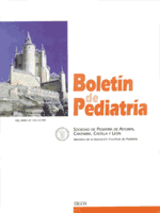Empeoramiento de las epilepsias inducido por fármacos antiepilépticos
B. Rojo , R. Arteaga , J.L. Herranz
Bol. Pediatr. 1999; 39 (170): 248 - 252
El empeoramiento de la epilepsia, inducido de manera paradójica por los propios antiepilépticos, es una complicación clínica referida en los últimos años, en la que pueden estar implicados cuatro mecanismos patogénicos: intoxicación, elección inapropiada del fármaco, encefalopatía o efecto paradójico propiamente dicho. Con motivo de la descripción de los casos clínicos de 3 niños, en los que la carbamazepina induce un empeoramiento clínico muy notable, se revisan los datos referidos hasta ahora en la literatura en relación con los antiepilépticos y con los tipos de crisis involucrados en estas situaciones de empeoramiento clínico paradójico, con la intención de que sean conocidos y reconocidos, y que no se confundan con la evolución natural de la enfermedad.
Exacerbation of antiepileptic drug induced epilepsies
Exacerbation of epilepsy paradoxically induced by antiepileptic drugs is a clinical complication that has been reported in recent years and in which four pathogenic mechanisms can be involved: poisoning, inadequate choice of the drug, encephalopathy or the paradoxical effects by itself. In order to describe the clinical cases of 3 children in whom carbamazepine induced a significant exacerbation, the data reported up to now in the literature in relation to the antiepileptic drugs and to the types of seizures involved in these situations of paradoxical clinical exacerbation are reviewed in an attempt to know and recognize them and to not confuse them with the natural evolution of the disease.
Artículo completo (PDF) (58 kb.)
- Neurología
